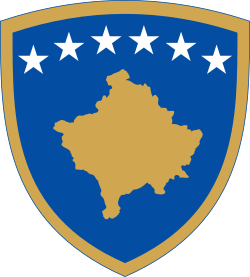New Kosovo Alliance
New Kosovo Alliance (Albanian: Aleanca Kosova e Re, AKR) is a liberal[1] political party in Kosovo that is in the current coalition government made up by the PDK and AKR. The party was founded on 3 May 2006, by Behgjet Pacolli, a businessman. He is the founding owner of Mabetex, the Swiss-based project-engineering firm that has managed significant engineering projects ranging from restorations in the White House in the United States to the rebuilding of the Kremlin in Moscow.
New Kosovo Alliance Aleanca Kosova e Re | |
|---|---|
 | |
| Leader | Behgjet Pacolli |
| Founded | 3 May 2006 |
| Headquarters | Pristina, Kosovo |
| Ideology | Liberalism[1] |
| Political position | Center[2] to center-left[3] |
| Regional affiliation | Liberal South East European Network |
| European affiliation | Alliance of Liberals and Democrats for Europe Party |
| International affiliation | None |
| Colours | Blue, Yellow |
| Assembly | 2 / 120
|
| Municipalities | 0 / 38
|
| Councillors | 36 / 994
|
| Website | |
| www | |
 |
|---|
| This article is part of a series on the politics and government of Kosovo |
| Constitution and law |
|
|
Foreign policy
|
Up until 17 November 2007, the AKR had not taken part in any elections as it was a new political organization. The party enjoyed significant support in Kosovo, with the April 2007 survey of BBSS Gallup International/Index suggesting that the AKR was the fourth-largest political party in Kosovo with 8% support amongst those surveyed. The survey showed that the AKR was lagging behind the Democratic League of Kosovo (LDK) (26%), Democratic Party of Kosovo (PDK) (17%), and the Alliance for the Future of Kosovo (9%).[4]
The AKR first ran candidates in the Kosovo elections which were held on 17 November 2007. The party won 12.3% of the vote and 13 seats in the assembly of Kosovo, making it the third-largest party in the nation. It was the largest official opposition party to the coalition government of the Democratic Party of Kosovo (PDK) and the Democratic League of Kosovo (LDK), led by Hashim Thaçi at the time.
On 22 February 2011, Behgjet Pacolli was elected as President of Kosovo by the members of Parliament. Immediately after becoming President, he resigned as the head of the AKR due to the Constitutional requirements that the head of the state cannot hold two different political functions simultaneously once in power.
On 4 April 2011, President Pacolli stepped down after his election as President was declared unconstitutional by the Constitutional Court of Kosovo. Most opposition members of parliament had boycotted the presidential vote due to their dissatisfaction with the candidates, and the court ruled this invalidated the election. President Pacolli earned respect for choosing to step down voluntarily and prevent the country from engaging in a political crisis. Many observers and foreign dignitaries, such as the United States ambassador to Kosovo, William Christopher Dell, commended the former President for his action.
The coalition government of the PDK and AKR continued, and the former president was appointed on 8 April 2011 as the first deputy prime minister of Kosovo. He was charged with leading a special task force to lobby for the recognition of the independence of Kosovo throughout the world.
Behgjet Pacolli was expected to return to leading the AKR by the end of July 2011. Rrahim Pacolli was to return to the post of general secretary of the party. Due to his efforts, in 2007 the party had gained its highest electoral success.
Election results
| Year | Votes | % | Seats | Position | +/– | Government |
|---|---|---|---|---|---|---|
| 2007 | 70,165 | 12.3% | 13 / 120 | 13 | Opposition | |
| 2010 | 50,951 | 7.29% | 8 / 120 | Coalition | ||
| 2014 | 34,170 | 4.67% | 0 / 120 | Extra-parliamentary | ||
| 2017 | Part of the LAA Coalition | 4 / 120 | Coalition | |||
| 2019 | Part of the coalition with NISMA and PD | 2 / 120 | Government support | |||
See also
References
- Nordsieck, Wolfram (2019). "Kosovo". Parties and Elections in Europe. Retrieved 9 October 2019.
- Hoare, Liam (20 February 2013). "Why Kosovo Still Matters". The Atlantic.
- "Kosovo | European Election Watch". Center for Strategic and International Studies. 2019.
- "Current political affairs in Kosova", Index Kosova, April 2007
External links
- Aleanca Kosova e Re
- Alliance for a New Kosovo: A Policy Resource on Kosovo Independence site no longer valid